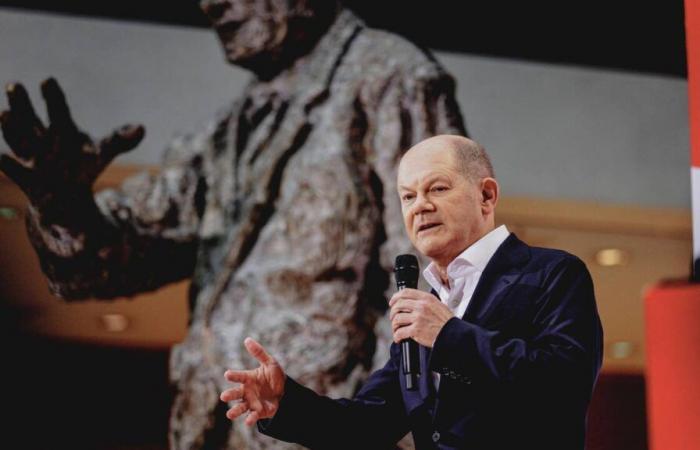A titanic task
Olaf Scholz, who more or less proclaimed himself a candidate after the breakdown of his coalition with the Greens and the Liberals on November 6, had to face a revolt within his party where some had spoken out in favor of the very popular Defense Minister Boris Pistorius. The latter had finally ruled out running for the nomination.
The task promises to be titanic for the oldest party in Germany, credited with only around 15% of voting intentions. The conservative opposition CDU/CSU received more than double that (33%), and the far-right Alternative for Germany (AfD) party was ahead of it with 18%. Olaf Scholz, “face” of the failure of a government marked by perpetual internal disputes, is “probably the weakest, least appropriate candidate for chancellor that the SPD has ever presented,” the magazine recently analyzed The mirror.
A campaign marked by support for Ukraine
His coalition, in power since the end of 2021, was shattered after the dismissal of the Liberal Finance Minister due to disagreements that had become insurmountable in terms of budgetary policy. “Making decisions (with three people) had become more and more complicated in these difficult times, and that is why it was right to put an end to this government,” he said.
The campaign will be placed under the sign of support for Ukraine against the Russian invasion and the modernization of a German economy, he said, while the largest European economy is shaken by an industrial crisis which brings almost daily its share of social plans. The chancellor also says he wants to fight to guarantee pensions, a crucial subject in an aging Germany.
In order to meet all these challenges, his party will support a “relaxation of the debt brake”, this mechanism which limits new borrowing by the State, at the heart of the dissensions within its coalition. Regarding Ukraine, he reaffirmed his decision not to provide Taurus missiles that could strike Russian territory in depth, thus departing from the position taken by its main allies, the United States, France and Great Britain.
Olaf Scholz has already presented himself for several weeks as the man of restraint in military support for kyiv, in the hope of capitalizing on the pacifism very anchored among the Germans since the Nazi horrors and a current of pro-Russian opinion not negligible.
Relief in the opposition camp
The conservatives did not hide seeing the chancellor’s candidacy with a certain relief. “Pistorius would have been more unpleasant for the CDU and the CSU,” said MP Mathias Middelberg. But Olaf Scholz, a veteran politician who was notably mayor of Hamburg (north) and vice-chancellor with the Finance portfolio in Angela Merkel’s last government (2005-2021), has shown several times his ability to thwart the predictions. He readily recalls how, in 2021, he won the elections against all odds.
If he then benefited greatly from the divisions in the conservative camp, he also cleverly presented himself as the true heir of the conservative chancellor, at the time at the zenith of his popularity. This time he also intends to reassure through his experience in a tormented global geopolitical context plunged into the unknown by the election of Donald Trump to the White House.
Opposing him, conservative competitor Friedrich Merz has little to present, party co-leader Lars Klingbeil mocked on Monday. Friedrich Merz “has never been a mayor, has never been part of a regional government, has never been part of a federal government, has never taken responsibility for this country,” he said. he listed.






